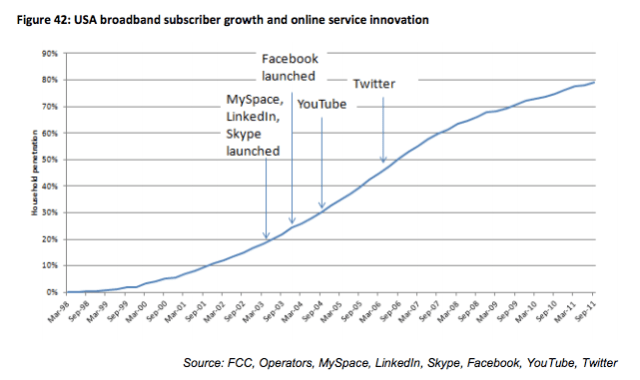The U.S. risks falling behind on online product innovation because it isn?t gaining a critical mass of subscribers to superfast broadband services (of 25Mbps+). That?s the scenario being painted by the Broadband Stakeholder Group, an advisory group to the U.K. government, writing in a new report examining global demand for superfast broadband services.
In a section on services, the report notes that in order to develop a new generation of internet services that utilise superfast broadband speeds Internet companies need a critical mass of subscribers in place before they can launch services ? in the same way that demand for first generation broadband prefigured the creation of successive waves of online companies

The problem facing the next wave of U.S. Internet innovators is that uptake of superfast broadband is relatively low ? the BSG calculates it?s less than three percent of total U.S. households ? meaning it?s a long way from reaching the necessary critical mass of users. Why is demand so low??According to the report,?the incentive for U.S. broadband providers to compete on speed grounds ? and thereby drive demand for superfast services ? is being suppressed by a focus on selling bundled pay-TV services, rather than standalone superfast broadband.
The report notes
Despite widespread availability [in the U.S.] over the last few years, superfast broadband has not yet taken off.?This can likely be explained by two factors. The first is that both cable operators and copper?incumbents are focusing on selling their TV services first, with broadband part of the bundle?with that service. Although this has usually been the approach for cable TV providers in most?markets, in the US the focus on Pay-TV services by the copper incumbents above the?broadband service is unique.
The BSG notes that neither Verizon nor AT&T are heavily promoting superfast broadband services ? and suggests the commercial threat from?online video services such as Netflix is likely far more front of mind for the companies than ?the limited competition on broadband that is?restricted by the existence of the territorial duopolies?.??This has meant that operators have?not competed on broadband speed in the same way that they have in other markets,?particularly in Europe,? the report adds.
It continues
The US was the home to online service innovation for the first generation of broadband. A number of these companies have become global giants. Whether such innovation will occur in the US this time, for next generation broadband, is perhaps a more open question. We have already seen that the US has a very low number of subscribers on genuinely superfast services, even counting those cable subscribers that have been uplifted. With the relative lack of competition in the US market, there is less of an incentive to compete on broadband speeds
when the dominant product in the bundle is the Pay-TV service ? this applies as much to the cable operators as it does to the copper-line incumbents.If this is to continue for any period of time, then the US will not reach a critical mass of superfast subscribers, and so will not reach the type of addressable market size that encouraged the early broadband innovators to develop new services ? we have previously noted Google?s foray in to FTTH buildout in Kansas City as perhaps a sign that they do not perceive the US?s broadband to be developing as they would wish.
The report goes on to suggest that if the U.S. does not act to accelerate superfast broadband adoption there is a potential opportunity for Europe to leverage faster uptake of superfast broadband to become the playground for the next wave of web innovation.
?If an addressable market of superfast broadband users can be created in Europe then it may become the new test-bed for online service innovators,? the report adds ? although it also notes that just having the users is not in itself a guarantee of anything, pointing to?high levels of superfast broadband uptake in Asian markets that have nonetheless failed to result in the development of ?an innovative online service environment based on superfast broadband?.
?There remains an open question as to where the next wave of innovation?will come from,? the report adds.
michael oher jerry lee lewis cesar chavez winning lotto numbers lottery tickets mega lottery sag aftra
No comments:
Post a Comment
Note: Only a member of this blog may post a comment.